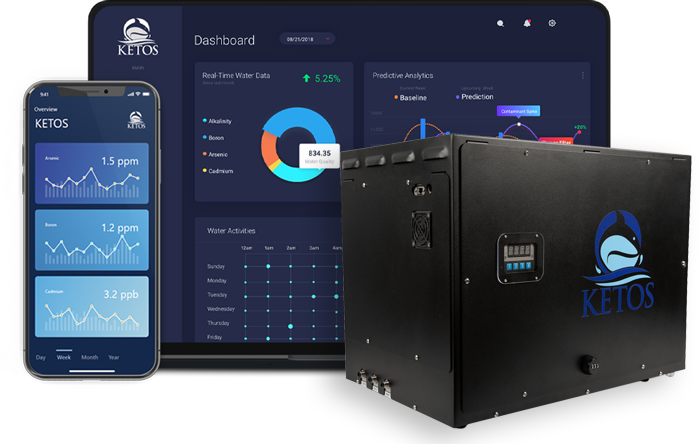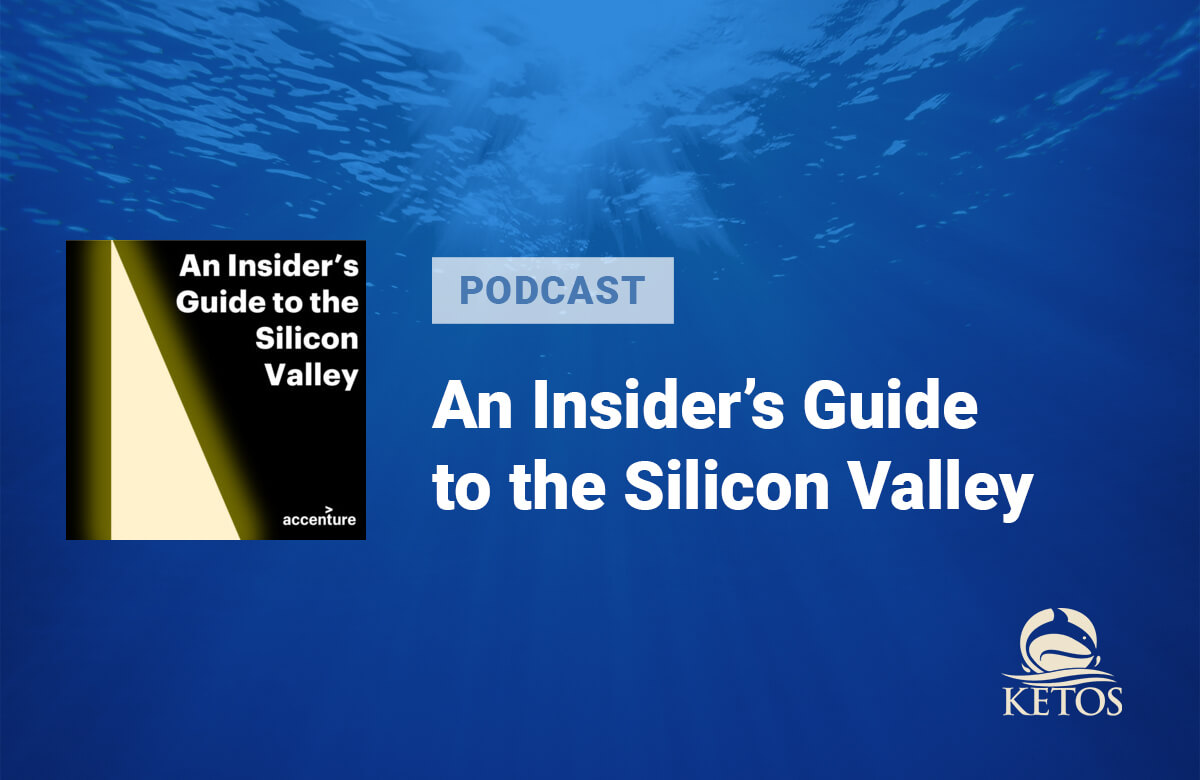Recently, KETOS CEO Meena Sankaran was invited to join host Tom Lounibos on An Insider’s Guide to Silicon Valley. This conversation takes place in the context of the ongoing climate discussions at COP27 (held in Egypt). While COP 27 ultimately closed with a breakthrough agreement surrounding “loss and damage funding” to vulnerable countries, water continued to be an important topic and will only continue to grow in urgency in the coming years.
With COP27 as the backdrop for discussion, Meena discusses the impact of growing up in India, the early struggle of only having access to one hour of water a day, and how such experiences ultimately drew her towards water technology.
The following is an excerpt of Meena’s discussion with Tom. Note that the conversation has been edited and sometimes shortened for flow and clarity.
For me, origin stories matter in a pretty significant way, and I find yours very compelling. You grew up in India, of course. How did the impact (of your upbringing) affect the person you’ve become, your career, and what impacts did your life in India bring to the table?
That’s it’s a beautiful question, Tom. I believe in roots. I truly believe how people grow up affects how they are influenced in the first few years of their life. And those early bonds we develop as a family unit act almost like the tools in your toolkit as you walk through life.
For me, personally, I’m one of those very lucky people who had a brilliant family unit. We did not have a lot of financial wellness. I didn’t come from the richest family. I was just another regular kid on the block in India, but the biggest differentiator for me was my parents. In terms of my mother, something that always struck me is her willingness to give regardless of what she had, and I think the sense of generosity that she brought to the table, and the compassion and the kindness and the forgiveness, I’m really glad I picked them up from her. My dad, on the other hand, was just this incredibly patient person, and both of them were so foresighted in their own way.
What bonded my father and my mother was that they were so focused on the education of their daughters. That’s very common now. India has become a very different country in the last couple of decades. However, four decades ago, and that’s kind of giving away my age a little bit, it was very different. Still, thinking about the early years, they were extremely farsighted. For me to say, “Hey, I’m going to go to the US and I want to study and I want to pursue higher education,” that was a curveball for them. I was the first person to go to college in our family. And they just said “how are we going to make this happen? Let’s go to the local library and see here versus the United States on a map.”
Long story short, a lot of who I am today comes from them. However, their sacrifice, resilience, and determination, are the values that I picked up from them. My dad only made 3000 rupees, which in today’s currency is $40 a month. Imagine $40 a month, and my mother raised a family on that! It’s incredible how they made it happen. And the best part – not once did they complain about money. Not once did we have to stress about money. It was the joy of togetherness as a family unit that sufficed. It’s made me focus on what’s important in life. And that’s why I say I’m so lucky. I’m so blessed. Most people don’t have those golden nuggets so early in their life.
Why do you think you decided to be the first in your family to go to college? What made you different than the rest of your siblings?
I don’t know how to describe the fire within you. You either have it, or you don’t. My parents managed paycheck to paycheck. And I don’t know how they made it happen, since they never shared that with their kids. For me, somewhere inside me, there was this fire that I just wanted to be able to get my parents to a life where they don’t have to count their pennies, I wanted them to be in a place where they were truly comfortable. They deserve that. And I wanted to give it to them. For me, the drive to make something of myself for them was the most important thing.
But also, growing up, we couldn’t even afford a water filter. And we’d only get one hour of water. You have to plan your entire day, and get everything like your mugs, utensils, everything filled with water when it ran. Because the water was for your restroom and your kitchen. My mother had it planned down to a science. Ultimately, she would boil the water three times thinking, Okay, this is good enough for drinking. And then I’m going to boil the one more time since this is for cooking.
They sacrificed so much that I had this drive to give back to them and then, even more so, to give back to the world that we’re in. It’s so lopsided in terms of the privileges that people have. Especially if you’re in a city like Mumbai – you will have a Ferrari next door to a slum. It’s really, really in front of you. That’s the beginning of how water problems took root inside of me – even though it was quite subtle during those early days. However, going abroad to get a foreign education and making an income that would help me uplift my family and my community as a whole was the strongest driver.
An age-old question that we try to answer here is: is it innate, or is it learned? In your case, it may be a little bit both. The fire, you were born with it. But you learned resourcefulness, creativity, and kindness from your parents and now you’re giving back.
One of the first cliffs that you jumped off was heading west heading to the United States for education. I get the drive for education, but you had your electrical engineering degree from Mumbai University. Why did you come even after that? Did you even know about Silicon Valley at that point in time? Did you know you wanted to be an entrepreneur? Why the University of Texas?
I didn’t know about Silicon Valley. Back then, I didn’t have a phone or a laptop. I’d never been on an airplane or to an airport. For me, one thing that was kind of subtle was the perception that America is the land of dreams, where opportunities are realized. That perception was strong. And so, I took the GMAT and TOEFL and started applying to universities. It was really hard to even pay for the university applications – which were $150 or $130 – and it’s not cheap for someone who’s really counting every rupee.
My father didn’t hold back. he said something which is hard to translate from Tamil to English. He said, “Even if I have to mortgage my head, I will do so to help you get to where you want to get to.” It was an indirect way of saying that he would not leave any rock unturned in his support for me. That was really his intent. And so he mortgaged our place and borrowed money from people. He managed to get me a one-way flight and $401 in cash. What’s hilarious is he didn’t know the meaning of 401. And neither did I. But I had exactly four $100 bills and $1.
In terms of universities, the top pick was George Washington. It was my dream actually to go to George Washington University. They have one of the best programs for electrical engineering in the country. I’d applied to seven universities and got in. But the problem was, I knew I couldn’t afford any. Applying was about me getting the confidence that, as a student, yes, I could be there, and I deserved to be. But I knew that I couldn’t afford any of them. Texas was the only state that actually offered you in-state tuition, even if you were a foreign student. And so, I knew I stood a chance if I came to Texas. So even though I had applied to other universities, somewhere deep down, I knew I would end up in UTA.
I didn’t go back to India for three years. But what has always been exceptional, and this is really worth sharing, is that my dad would go to the local internet cafe and every single day, he would send me an email. He would just write a few questions. He would explain how his day went, and how mom’s day went. I don’t even know how many times I responded. I was probably not great at responding. I was really tied up at school. But it was the best part of the day. I looked forward to reading his emails because they boosted morale. Reading those emails every day was just like getting your vitamin C. Even today, and I’ve been in the US for over 21 years, even today, he has not skipped a day.
Being an entrepreneur, if you don’t have those roots, if I didn’t have those friends, it’s hard. It’s so important for what you do because it’s such a lonely job to be a founder and CEO.
Absolutely. I sometimes joke that my parents know as much as my board does. Just being able to share a variety of things with them is great. Regardless of their understanding of technology or anything that I’m doing, it doesn’t matter. They ensure they’re giving me the exact dose of moral support to help me remain centered and balanced. The most important thing you can do as an entrepreneur is remain centered. If you’re not centered, if you’re not balanced, if you’re not able to maintain that sort of decorum, you will not make sound decisions.
I always remember that no matter how bad it gets, I did not have 100 people helping me when I started this. It was just me. If I did that once, I could always rebuild. I keep reminding myself that it doesn’t matter how many times you fall down. What matters is how you rise up. No one will even talk about what happened to you two years ago, what happened to you five years ago. Everyone’s going to talk about that moment when things come to fruition. You’re constantly programming and reprogramming and recalibrating yourself to all the situations around you. That’s how I felt, landing in the country, coming into the US.
One thing that has stayed with me is my absolutely unwavering focus and commitment to whatever I’ve signed up to do. It would be very wrong of me if I did not to mention just how incredibly lucky and blessed I’ve been in this entire journey to have some amazing angels. I have parents, of course, but they’ve always been in India. So there are also the angels here in the United States who have supported me.
I’ve heard you talk about life angels and a specific professor that helped you in significant ways.
It definitely takes a village. You cannot undermine the support ecosystem you need when pulling off a vision like this.
I’m an eternal optimist. I’m also a very spiritual person. I do believe in energy. I honestly believe that the universe can unleash and open every door possible. I came to this country with absolutely no support system. But this professor, Professor Truman Black, knew I was good in physics. He asked me to test for a physics TA. I tested, and he looked at me, and just asked straight up, “What do you want?” It’s a simple question. Most people will give an answer that they believe the other person wants to hear. And I basically just said, “I need financial aid. I’m really good at physics. Can you help me with actual financial support or a scholarship?” I figured, what is the worst thing that can happen? He’s going to say no. But if I don’t ask for really what I want, I’m never going to know.
That was one of my first lessons in life – always be clear in asking for what you want. And you won’t believe what Dr. Black said. He said, “Okay, I’ve got a few people who will interview you in the next 10 minutes. Are you ready?” He fought with his department to get me the scholarship, which was a huge benefit. But what’s more important than that is he really, really showed his human side, which I’ll never forget, which makes me talk about him to this day. He basically invited me home for Thanksgiving or Christmas, and I took his grandkids trick or treating for the first time. I didn’t know what Halloween was. But it’s the small things that make such a big difference in people’s lives.
After graduation, you became a very successful engineer for 15 years with Tata, Cisco, and other players. What provoked you to become an entrepreneur?
That’s where Silicon Valley did influence me. Working in a corporate environment was phenomenal. The one thing that helped me along my career is I did not jump from one job to the other, which is common nowadays. It’s very important that you value relationships and to have loyalty and a commitment to people. Those long-term professional relationships have served me very well in life.
While working in corporate, however, it didn’t feel as fulfilling to me because I felt like I was at an inflection point where I wanted to do something meaningful. I wanted actually to leverage technology to achieve a bigger social impact and not just have mass commercial value. I wanted to really solve challenges that would affect future generations.
The problem was a lot of the conversations I would have with people in Silicon Valley would be like, “join a startup, become a millionaire, and then go into philanthropy.” My thought process was that only one in 1000 startups are successful, so you have no idea if you’ll succeed. Second, that means I’m going to have to wait for another decade and then potentially become a philanthropist and then help somebody, But I want my day-to-day life to be meaningful. That became more and more clear in my head.
I was a part of two different Silicon Valley startups, tech startups, and I was in all this high-tech enterprise where I could have potentially been in an executive role and have a very lucrative job. But it’s very important for people to know that there is no linear growth or path to your career. And It’s not a straight line that’s just based on title changes. I challenged myself to move outside my comfort zone. That has always been my biggest strength. I was never afraid to feel uncomfortable.
I love the origin stories of companies. That Aha! Moment. Your personal history aside, we also have enormous water issues. Wars have been fought over water. Over 5 million people a year die from some form of water contamination. So what was it about water quality that made you say “I’m going to tackle this”?
I was backpacking through Nepal. I had quit my job, and I decided that I was going to do something on my own. I knew it would be around impact and challenges around air quality or water quality. Believe it or not, I designed a mask for air quality in 2015. At the time, one of the investors, very early in conversation, said, “who in the US is going to wear a mask and care about air quality?”
I was concerned mainly with air quality due to just how bad air quality is in India. But I was caught in the Nepal earthquake. I have an incredible sister who got me airlifted after six days from the earthquake. I was stranded, high up in the mountains, so I had to wait until the helicopters made it. But I had a lot of time to think for those six days.
Every few minutes, there was a little bit of a shake, and you didn’t know if you would make it or not. It was a very interesting time. But what was intriguing to me at that point is, as I was boiling snow and drinking water, I really decided I was not going to spend another day of my life doing a job that didn’t feel like it was moving me towards a purpose or an impact, or it’s not being mission-driven. And that’s where water comes in.
What challenges have you encountered building your own company as a woman founder?
For women, the stakes are different. The bar is different. All of the milestones are different. I get asked not how I’m going to succeed but how I am going to avoid failure. It’s a very different tone.
Fundraising was very difficult for the first couple of years. I was so used to hearing no. Rejection was a common thing. I don’t think it’s unique to me. It’s very common for women founders. You end up spending more time justifying why you deserve the money than actually spending time talking about how successful you can actually make that investor, which is really sad.
The unfortunate part is also how the stakes are always set up against us in terms of being a mom. It’s as a mark against people. I don’t hear a lot of VCs talking to male founders who just became dads saying, “Hey, who’s going to run your company?” I don’t hear those kinds of questions asked of male CEOs. I have outright been asked, “Are you going to get a white male co-founder?” It’s sad that the true essence of investment is not based on performance criteria. But while performance criteria might account for a bit, so much more value is placed on other things that categorize you more according to gender versus what you bring to the table.
For example, I was getting lots of comments, like, “Oh, you’re doing such a great thing,” but nobody believed I would actually make it this far.
We’ve got to figure out how to get beyond gender stereotypes, and the best way to get beyond it is to have women VCs and more people with control of the capital. And that’s going to be the foundation of change.
I was just going to make one comment that we don’t get rid of people like you, Tom, because we need thought leaders who are actually going to represent and support women through their lens and make our voices heard.
I don’t think gender has anything to do with your success. I think it’s just the fire, the family, and the people supporting you. You’ve got a North Star. But you’re also wicked smart. It was the easiest investment I’ve ever made. You know, some of the things that you’ve done to build this company and how you built the culture, you inspire me. KETOS is going to change the world. And for the better. You’re going to deliver quality water to people, to companies, and to societies in a more efficient and effective way. And I’m just your biggest fan. Meena, thanks for joining us today and sharing your story. It was so powerful.
Thank you, Tom, I really appreciate it, and I’m really grateful for the entire Accenture team’s support and investment. I can’t wait to really do some amazing things together.





